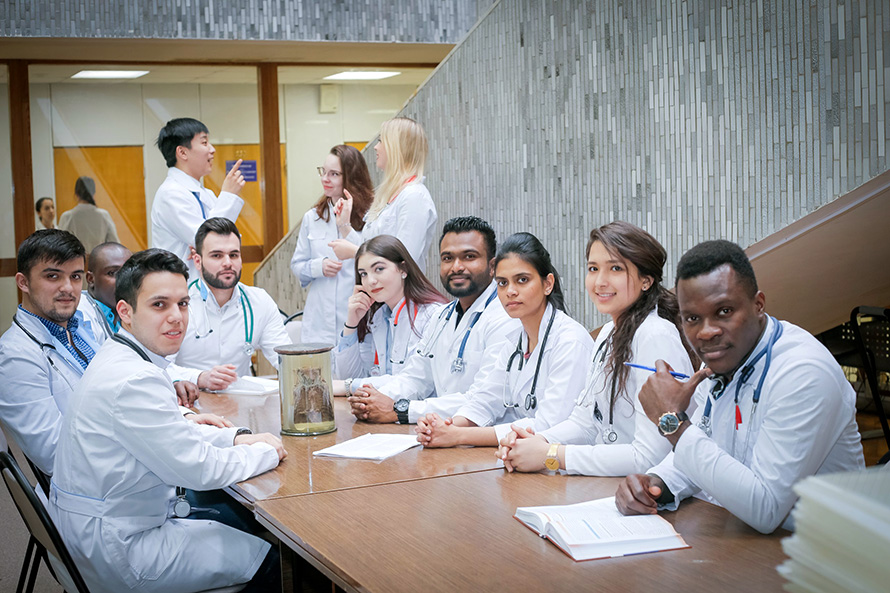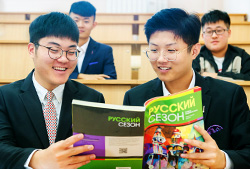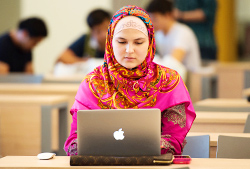Russian medical universities train specialists in all areas. International students can choose higher education centres in the Russian capital or any Russian region. The length of study depends on the specialty. Prospective students can be admitted to:
-
Bachelor’s degree programmes in Nursing Care (length of study: four years);
-
Specialist degree programmes in Dentistry (length of study: five years and more), General Medicine, Paediatrics (six years and more);
-
Residency programmes (specialty training lasts two to four years);
-
Three-year postgraduate studies (full-time and extramural) for those who wish to do research and defend a thesis at best medical universities.
Specialised programmes for future doctors and researchers are available at medical universities or medical departments of Russia’s major higher education centres.
Moscow Universities
The best known and forward-looking universities include
-
Sechenov First Moscow State Medical University;
-
People’s Friendship University of Russia (a powerful multi-discipline university popular with foreign nationals);
-
Moscow Engineering and Physics Institute (MEPhI), a leading research centre where medical students can train in advanced and emerging technologies.
Sechenov First Moscow State Medical University (MSMU)
MSMU’s well-established General Medicine, Dentistry and Pharmacy Faculties boast rich traditions of training and advanced and interesting areas of study such as geriatrics, nutrition science and genetics. It is Russia’s oldest medical university which offers the largest number of study areas and programmes.
-
Preparatory Department for international applicants (for prospective bachelor’s and master’s students) and an add-on five- or ten-month foundation course, depending on proficiency in Russian;
-
Training at MSMU faculties: specialist degree studies and residency in classical or rare specialties such as Diving Medicine (tuition fee: 367,000 rubles a year);
-
Post-graduate programmes (for example, extramural programmes tuition fees range from 230,000 and 320,000 rubles a year);
-
MSMU has the following faculties:
-
Faculty of Medicine (the oldest practice and research unit which trains specialists in clinical medicine and all other specialties);
-
Faculty of Preventive Medicine (Russia’s largest medical institute that trains public health doctors (hygiene, epidemiology);
-
Institute of Pharmacy: in addition to the core degree programme, it offers training in biotechnology and bioengineering;
-
Institute of Dentistry: Paediatric Dentistry, Adult Dentistry (specialist degree programme tuition fee: approx. 520,000 rubles a year);
-
Faculty of Paediatrics: tuition fee is about 450,000 rubles a year;
-
Faculty of Higher Nursing Training, Psychology and Social Work.
People’s Friendship University of Russia (RUDN)
RUDN offers programmes in
-
General Medicine (full-time);
-
Dentistry (full-time);
-
Pharmacy (full-time, extramural).
RUDN residency programmes cover a majority of specialities including surgery, paediatrics, psychiatry and dentistry. Second degree programmes and postgraduate courses in 33 specialities are available as well; the University has nine Academic Boards that award PhD and doctoral degrees. RUDN is known for English medium programmes such as cardiology (tuition fee is upwards of 260,000 rubles a year). The university cooperates with research centres and large clinics.
National Research Nuclear University MEPhI
MEPhI is one of Russia’s first national research universities. In 2016, QS put it in the top 50 BRICS universities. Though MEPhI’s core mission is engineering education (based on the Moscow Physics and Engineering University) it actively pursues medical research and designed medical programmes such as Medical Physics and Nuclear Medicine.
This university is for those who are keen on advance medical technology. Foreign nationals can take MEPhI foundation programmes.
The institute’s education programme relies on the credit and module system. Students have the opportunity to
-
Complete modules as part of the programme implemented with partner medical universities;
-
Take internships at research centres and laboratories across the world;
-
Complete a double degree programme.
Level: master’s degree. Language of instruction: Russian or English. Visit the English medium programme page. Length of study: two years.
Tuition fee for Russian or English medium programmes: 196,820 rubles per semester.
Degree: Bachelor’s degree. language of instruction: Russian. length of study: four years. Tuition fee: 176, 410 rubles per semester.































































